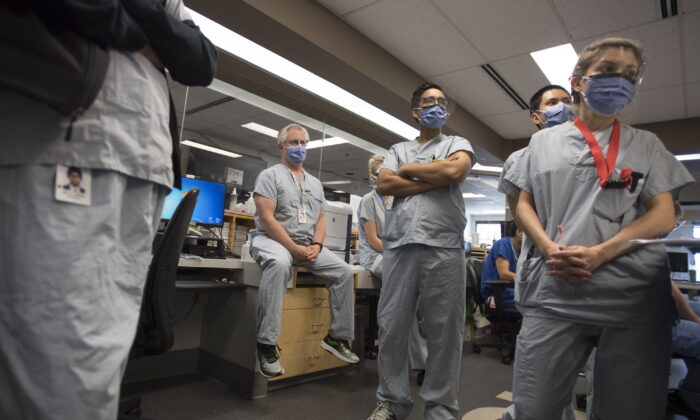Amazon Turns to Chinese Firm on US Blacklist to Meet Thermal Camera Needs
VANCOUVER—As a senior physician at St. Paul’s hospital, Dr. Del Dorscheid has a special view of how COVID-19 is affecting patient care beyond the pandemic.
Unlike other parts of the hospital, the intensive care unit he oversees has not been emptied in anticipation of a surge of cases. Staff treat COVID-19 and non-virus patients alike, and continue to support families as they come to terms with critical illness.
Dorscheid also runs a provincial asthma clinic for about 1,200 patients virtually.
“Even if I’m here in the ICU, in the background I still have other patients who need to be cared for. It gives me an interesting out-patient and in-patient experience as to what COVID is doing to health care in this province,” Dorscheid said.
 A “prone team,” wearing personal protective equipment (PPE), turns a COVID-19 patient onto his stomach in a Stamford Hospital intensive care unit (ICU), in Stamford, Ct., on April 24, 2020. (John Moore/Getty Images)
A “prone team,” wearing personal protective equipment (PPE), turns a COVID-19 patient onto his stomach in a Stamford Hospital intensive care unit (ICU), in Stamford, Ct., on April 24, 2020. (John Moore/Getty Images)His asthma patients are terrified of entering a hospital and even if they did, most out-patient testing has been shut down. The novel coronavirus has limited huge portions of the non-COVID population from accessing timely and appropriate out-patient care they need, he said.
Death is ever present in the ICU. Normally, about 85 percent of admitted patients survive, Dorscheid said.
The doctors and nurses who care for the critically ill already understand death is a reality. But COVID-19 has added an emotional burden to their work.
 A medical worker works at the intensive care unit of Jinyintan hospital in Wuhan, the epicenter of the novel coronavirus outbreak, in Hubei Province, China on Feb. 13, 2020. (China Daily via Reuters)
A medical worker works at the intensive care unit of Jinyintan hospital in Wuhan, the epicenter of the novel coronavirus outbreak, in Hubei Province, China on Feb. 13, 2020. (China Daily via Reuters)The grieving room is now empty, and the rooftop garden is no longer a place for goodbyes. Dorscheid said he’s struggled with how to provide the same compassionate care to families under limitations imposed during the pandemic.
“For me it’s very important to have the physical contact with those individuals. I see their body language, I see who the matriarch, the patriarch is, you see all of that,” he said.
There is also a spiritual purpose to their work, he said.
“We’re all going to die, and that’s not something to be scared of. What we want to protect is the understanding of that individual and what they meant to those persons’ lives, and that passing can be gracious and comfortable and actually a very beautiful thing.”
 Medical staff take care of a Covid-19 patient in the intensive care unit at the University hospital of Aachen, western Germany, on April 15, 2020. (Ina Fassbender/AFP via Getty Images)
Medical staff take care of a Covid-19 patient in the intensive care unit at the University hospital of Aachen, western Germany, on April 15, 2020. (Ina Fassbender/AFP via Getty Images)Dorscheid and his team recently made special arrangements for the children of a patient who didn’t have COVID-19 to say goodbye before he died.
Only two family members would be allowed per day for a maximum of two days, a formula rooted in disease modelling. A nurse would meet them at the hospital door. They would be screened, gloved and gowned, and informed not to touch anything—not even their father.
“I still struggled with that a bit. At least they get to see him. But I mean, the number of family members who will take their hand, kiss their forehead and say goodbye—they can’t do that anymore,” he said.
“People die alone now.”
Dying alone is something staff at St. Paul’s in the city’s downtown core have long resisted. The hospital treated HIV patients in the 1980s and 1990s when others shut their doors. Today, patients include Vancouver’s most marginalized. About one third of Dorscheid’s patients have no family.
“The nurses and doctors of this hospital understand that and we kind of become surrogate family and make sure that person has great care, whether it’s in life or in death.”
By Amy Smart
This article is from the Internet:Operating Changes in ICU to Deal With COVID-19 Pandemic
Illinois Governor Under Scrutiny for Releasing Convicted MurderersTaurean Giles
